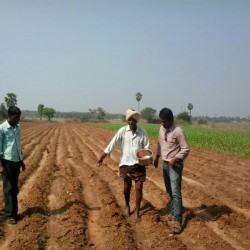What is Potash
Potassium (K), along with nitrogen and phosphorus, is one of the three essential plant macronutrients, and is taken up by crops from soils in relatively large amounts. Potassium increases yields and improves the quality of agricultural produce, and enhances the ability of plants to resist diseases, insect attacks, cold and drought stresses and other adverse conditions. It helps in the development of a strong and healthy root system and increases the efficiency of the uptake and use of nitrogen and other nutrients. In addition, K has an important role in livestock nutrition. Vegetal tissues contain an average of 2 to 10% of K, therefore it is required in large quantities by the growing plant.
The importance of potassium stems from its multiple role in the plant: it is involved in the activation of more than 60 enzymatic systems in the plant cell, and in the synthesis of proteins, vitamins, starch and cellulose which ensure normal plant metabolism, plant growth and formation of strong vegetal tissues. Potassium helps in the photosynthesis process, through which the sugars and energy that the plant needs for its development are formed and converted. Potassium also controls the opening and closing of the leaf stomata, which regulate the water status in the plant. It plays an essential part in the formation of starch and in the production and translocation of sugars; it is, therefore of special value to carbohydrate-rich crops, e.g., sugarcane, potato and sugar beet. The increased production of starch and sugar in legumes benefits the symbiotic bacteria and thus enhances the fixation of nitrogen.
Potassium not only increases yields, but also enhances crop quality. It improves the nutritive value of grains, tubers and fruits by increasing the contents of protein and oil in seeds, of starch in tubers and seeds, and of vitamin C and sugar in the fruits. With an adequate supply of potassium, cereals produce plump grains and strong stalks. Potassium also improves the flavor and color of the fruits and increases the size of tubers and fruits. In addition, it increases the resistance to various injuries during storage and transportation, thus extending shelf life.
Deficiency symptoms: Plants lodge easily and are sensitive to disease infestation. Older leaves have burned edges (scorching), and since K is mobile in the plant, the bottom leaves are always affected first.
K increases yield and quality of agricultural produce, enhances the ability of plants to resist biotic stresses (diseases, pests and insect attacks) and a-biotic stresses (cold and drought) and improves the efficiency of nitrogen use.
- K activates large numbers of enzyme systems
- K is required for N uptake and synthesis of protein
- K is essential for photosynthesis
- K is essential for tissue water balance and high water use efficiency
- K promotes translocation and storage of assimilates
- K increases nitrogen fixation in legumes
- K favours a high energy status in plants





